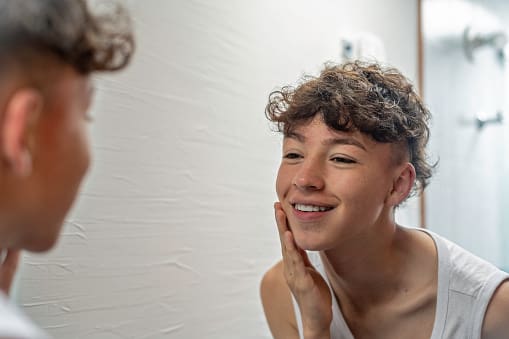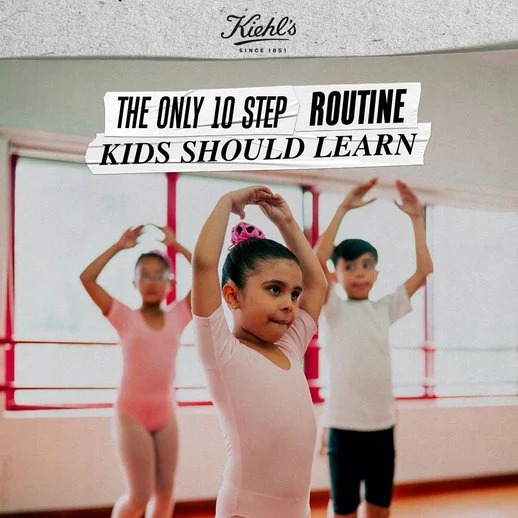Skin Savvy:
Teaching Preteens Skin Care Essentials

It has been widely reported that social media trends are shaping the beauty habits of preteens and teens. Digital platforms push content promoting the latest skin care products and routines from influencers. These viral trends, primarily on TikTok and Instagram, are driving preteens and teens to use anti-aging products intended for mature skin.
Finding the right skin care approach for preteens and teens can be challenging. CosmeticInfo’s mission is to provide clear, science-backed information to help empower preteens, teens and their caregivers in developing age-appropriate skin care routines and habits. The resources shared here highlight effective skin care practices that prioritize the health and well-being of preteens and teens helping them feel confident and informed in their skin care.
Preteen Skin is Unique. Here’s Why:
Preteen skin can vary widely because of hormonal fluctuations during puberty. Some preteens have oily, acne-prone skin while others have dry, more sensitive skin.
Oiliness: Preteen skin tends to be oilier than adult skin due to an increase in hormonally driven sebum production. This can lead to shiny skin and occasional breakouts.
Pores: Pores may appear larger during preadolescence due to increased oil production, which can lead to clogged pores.
Acne: Some preteens may experience acne or pimples as their hormones fluctuate. Using skin care products labeled non-comedogenic can help prevent breakouts.
Dry Skin: Preteens can have dry, sensitive skin. Using fragrance-free, gentle skin care products can help.
What Parents & Caregivers Need to Know
Helping Your Preteen Make Smart Skin Care Choices
Lifelong skin wellness: Start with a straightforward, age-appropriate skin care routine for your preteen to form the foundation for good skin care habits, including cleansing, moisturizing and protecting their skin from the sun. Highlight how starting these habits early can prevent skin problems in the future.
Simplicity and consistency are key: Encourage independence and responsibility by helping them create a consistent, easy-to-follow routine and develop discipline and an understanding of the value of caring for themselves at a young age.
Tailor their skin care routine: Discuss how skin types can affect their product choice. Teaching them how to identify their skin type by observing how their skin reacts after washing—whether it feels tight, greasy or comfortable can indicate their skin’s nature.
Shop smart for skin care products: Teach your preteen to read labels and identify beneficial ingredients. Encourage them to avoid products with alcoholAlcohols are a large class of important cosmetic ingredients but only ethanol needs to be denatured to prevent it from being redirected from cosmetic applications to alcoholic beverages. or unnecessary additives that can irritate young skin.
Simple is Better!
Regardless of skin type, it is essential to establish good habits early to promote healthy skin through adolescence and beyond, to protect the skin from environmental damage, preserve the skin barrier and avoid irritation. When considering a preteen skin care routine, keep it simple. Skip toners, astringents, serums and anti-aging products unless recommended by your health care provider. Instead, choose a gentle cleanser, daily sunscreen with SPF of at least 30 and a non-comedogenic moisturizer to use at bedtime. This basic skin care regimen is appropriate for preteens with all skin types.
Look for items labeled as non-comedogenic (won’t clog pores), fragrance-free (to avoid possible irritation) and gentle. Cleansers containing salicylic acid can help unclog pores. Aggressive scrubbing, abrasiveIngredients used for abrading, smoothing or polishing, such as emery or pumice. or granular cleansers can cause irritation and may actually worsen acne.
When trying a new product, test it on a small part of the skin on the neck for several days to check for any adverse reactions or irritation before regular use. Skin care products, especially those for young, sensitive skin, must meet stringent safety standards and undergo testing before they can be sold to consumers.
Ingredients to Look for
These moisturizing ingredients are gentle and help keep preteen skin healthy:
- Glycerin: Keeps the skin moist, smooth and soft without making it oily.
- Ceramides: Help to prevent water loss from the skin by forming a protective barrier that locks in moisture to help keep skin hydrated, soft and supple. They also help protect against skin damage from pollution or dry air irritation.
- Hyaluronic Acid: Attracts water to the upper layers of the skin, helping it stay hydrated.
- Niacinamide: Maintains a healthy skin barrier.
Ingredients to Avoid
Unless recommended by your health care provider, these anti-aging ingredients may be too irritating for preteen skin and are generally unnecessary.
- Retinol: Enhances the appearance of aging skin by repairing sun-damage. It helps reduce the appearance of wrinkles, brown spots and improves skin texture. Retinol is generally unnecessary and can cause irritation in young skin especially if it is normal to dry.
- Exfoliating Acids (AHAs): Help exfoliate dead skin cells to make the skin appear brighter. These ingredients, such as lactic acid and glycolic acid, are chemical exfoliants that can be irritating and are generally not appropriate for young skin.
- Antioxidants (like Vitamin C): Protect the skin from damage and aging but are generally unnecessary for young skin. Some forms of vitamin C can cause skin irritation.
- Peptides and Growth Factors: Help heal damaged skin and build collagen (which makes skin firm). Young skin does not need these ingredients.
What Products Should Preteens and Teens Use?
Gentle Cleanser
Choose gentle and effective cleansers. Products containing mild surfactants—ingredients that help degrease and blend oils and fats and suspend soil so they can be washed away—and natural moisturizing ingredients like glycerin or ceramides.
Moisturizer
Look for lightweight formulations that hydrate and support the skin barrier without heavy oils or fragrances, which can irritate sensitive skin and make acne worse.
Sunscreen
Wear sunscreen every day. Make sure they use a broad-spectrum sunscreen that protects against the harmful effects of UVA and UVB rays and has a sun protection factor (SPF) of 30 or higher.
If your preteen has specific skin concerns, check with their doctor or a dermatologist for specific advice.
What Experts Want Preteens and Teens to Know
“[Preteens and teens] definitely don’t need to use retinol. If [preteens and teens] are having acne, then they should see their doctors or dermatologist and get it prescribed rather than go for an anti-aging serumThe fluid part of the blood that remains after blood cells, platelets, and fibrogen have been removed., which does have some retinol, but the original intent is not to treat acne, and it’s also in the wrong formulation to treat acne.”
“The number one thing we stress is sunscreen. Kids should develop that habit early so that it becomes part of their normal daily routine.”
“It is important to find a routine that is best for your individual needs and concerns and not just use the product that is trending on social media.”
“Daily use of SPF is the most important part of skin care, especially in youthhood, to prevent any damage later on.”
“It’s not necessarily a bad thing to start a routine early when it’s the correct regimen for their skin.”
What Brands Want Preteens and Teens to Know
“We strongly believe that kids should be kids, and that children have absolutely no need to use anti-ageing skincare products. In fact, the only beauty products that children should use are those designed to provide basic hygiene, personal care, and sun protection benefits; in addition to managing any skin conditions, including eczema and acne, when required.”



Dove believes a 10-year old’s face should be a canvas for care-free fun, not anti-ageing products. Dove, alongside Dr Phillippa Diedrichs, Research Psychologist at the Centre of Appearance Research at the University of West England and body image expert certified dermatologist Dr.Marisa Garshick have created: The Gen A Anti-Ageing Talk’ a free resource on how to talk to young people about anti-ageing and beauty anxiety.
“When did 10-year-olds start worrying about wrinkles and getting older? It is time to speak up to highlight the absurdity and protect their self-esteem,” says Firdaous El Honsali, Global Vice President, Dove.”At Dove, we believe beauty should be a source of happiness, not anxiety. For two decades, we have taken action to build confidence and self-esteem for millions of girls. Today, our girls are anti-aging before they’ve even started to grow up and need us more than ever.”
“First, I would say stay away from our more potent products that include acids and retinols—their skin does not need these ingredients quite yet.”
